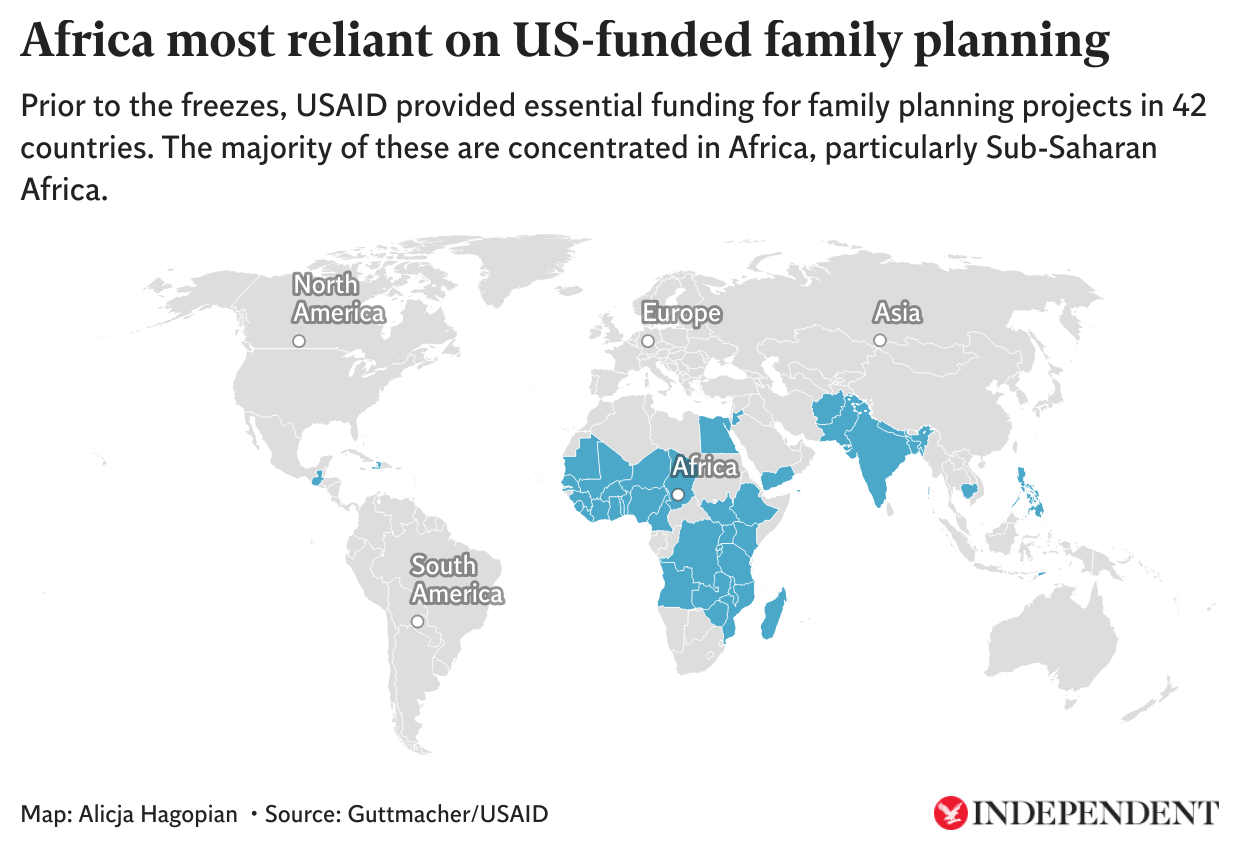The Trump administration’s plan to destroy a warehouse full of contraceptives, rather than distribute them to low-income countries, will leave more than 1.4 million people without essential medical care, the International Planned Parenthood Federation (IPPF) has found.
More than three-quarters of the $9.7m (£7.2m) worth of supplies were destined for just five countries: the Democratic Republic of the Congo (DRC), Kenya, Tanzania, Zambia, and Mali. Tanzania, which was due to receive more than 40 per cent of the stock, will be the hardest hit.
The Reproductive Health Supplies Coalition, which brings together governments, private companies and charities to make contraception accessible, has projected that without these supplies there will be 174,000 more unintended pregnancies and 56,000 unsafe abortions.
The plan forms part of wide-ranging cuts to US foreign aid, which includes stopping providing birth control to lower-income countries. A State Department spokesperson said the US had “avoided an additional $34.1 million in taxpayer costs by negotiating no-cost cancellations of pending orders”. However the destruction of these supplies – which have already been paid for – is estimated to cost $167,000, according to the US government.
IPPF said its offers to take on the costs of donating the contraception - which includes pills, implants and injections - rather than letting it go to waste had been rejected. The supplies were largely not due to expire for between two and five years.
The United States Agency for International Development (USAID) was one of the world’s biggest providers of contraception.
Without these contraceptives, women and girls are unable to choose how to protect themselves, Dr Bakari Omary, project coordinator at Tazanian sexual and reproductive health NGO Umati explained.
“The impact of the USAID funding cuts has already significantly affected the provision of sexual and reproductive health services in Tanzania - leading to a shortage of contraceptive commodities, especially implants. This shortage has directly impacted clients' choices regarding family planning uptake.”

In many of these countries, options like implants and long-acting injectable contraception are particularly popular because they grant women discretion and control when their partners may not approve of them taking pills for example.
In Tanzania, a million injectable contraceptives and more than 350,000 implants have been earmarked to be burnt - almost a third of the contraception needed for a whole year.
In Mali, more than a million contraceptive pills and almost 100,000 implants are being withheld and risk being destroyed - a quarter of the country’s annual needs, while in Kenya more than 100,000 promised implants are not being distributed.
Executive Director for the Reproductive Health Network in Kenya, Nelly Munyasia, said these setbacks had come at a time when unmet need for contraception was already high - with profound implications for the lifechances of women and girls.
“Nearly 1 in 5 girls aged 15–19 is already pregnant or has given birth. Unsafe abortions remain among the five leading causes of maternal deaths in Kenya,” she said.

A US State Department spokesperson confirmed that a “preliminary decision was made to destroy certain birth control commodities from terminated USAID contracts”.
However, the current status of the supplies remains somewhat of a mystery. While The Independent has been told that at least some of the contraceptives were in transit, the Belgian, French and US governments would not confirm whether any of the stock had reached France.
A Belgian government spokesperson said the country remained committed to exploring, “all possible avenues to prevent the destruction of these stocks and continues to engage in discussions with the American authorities”.
Major waste management companies including Veolia and SUEZ have denied involvement in the incineration. Hormonal contraceptives require specialised disposal to prevent the hormones from polluting the environment and entering the water supply.
President of IPPF’s French member association, Le Planning familial, Sarah Durocher, said: “We call on the French government to take responsibility and act urgently to prevent the destruction of USAID-funded contraceptives.
“It is unacceptable that France, a country that champions feminist diplomacy, has remained silent while others, like Belgium, have stepped in to engage with the US government. In the face of this injustice, solidarity with the people who were counting on these life-saving supplies is not optional: it is a moral imperative.”
This article was produced as part of The Independent’s Rethinking Global Aid project
Ukraine war latest: Trump speaks to Zelensky as US to decide on sanctions
US vice president JD Vance to stay with David Lammy as he holidays in Britain
Blue chips in favour ahead of likely Bank of England interest rates cut
Mental health ward ‘severely short-staffed’ on day teenager self-harmed, inquest told
How much outside time do city dwellers need to boost their mental health?
Experts reveal potential side effect of Ozempic – and whether we should worry







